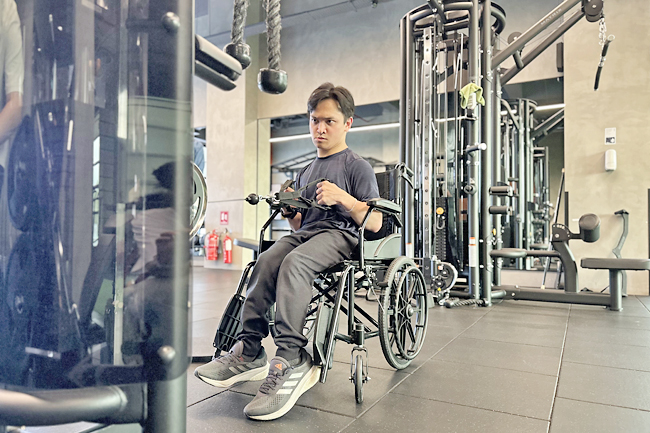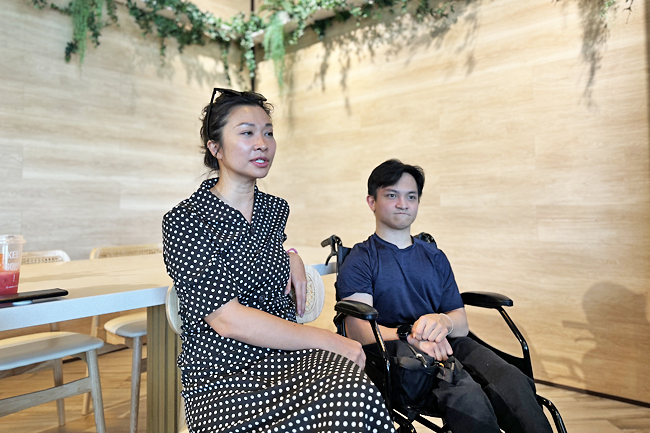At 26 years old, clinical admin Abdul Qawi bin Haji Shaharuddin Khairul is like any other hot-blooded young man.
He enjoys going to the gym, and when he’s not lifting weights, you can find him at the latest local café that’s just popped up, enjoying a cup of coffee either with his two younger brothers or close childhood friends.
“I like coffee. It’s kind of a trend, and I try to visit a new café each week,” said Qawi during an interview with the Weekend Bulletin, beaming widely as he sat in his wheelchair. His spectacles often tilt a bit lopsided with each rise of his cheeks.
In many ways, Qawi is just like you and me. He wakes up every day with great optimism, makes his bed and does his daily stretches.
But unlike us, these stretches are essential because of his medical condition – cerebral palsy (quadriplegic).
Cerebral palsy is a neurological disorder that affects movement, muscle tone and posture. It is a spectrum, meaning no two people with cerebral palsy are the same; each individual’s experience and abilities are unique.
In Qawi’s case, quadriplegia affects all four limbs, thus making daily stretches crucial to maintaining mobility and well-being. It also affects his speech due to the constant neck and spine pain.
“When I have my good days, I can move smoothly without any pain, whereas on bad days, I usually struggle with daily activities, like wearing my clothes (or)… transferring from my chair. So during those days, I normally have someone to help me so that I won’t slip or fall,” he said. “The most difficult part about it is that I can’t control it (but) I am independent on my own, most of the time.”

A SERENDIPITOUS CONNECTION
Fortunately, Qawi’s zest for life keeps him from being idle. For the past two years, he has maintained a part-time job, working five days a week for at least half a day – a significant achievement for the coffee lover, considering he initially started on a trial basis, working just a day or two a week at most.
Qawi loves his job, especially because he works at an occupational health clinic that specifically caters to children.
For him, the work offers a sense of normalcy. Recently, it occurred to him that his mere presence at the office has become a source of inspiration for clients, particularly parents with children who may face similar challenges. Occupational therapist Vanessa, who is also Qawi’s employer, shared the story of their journey together, reflecting on how Qawi was once her client before she set up her practice, OT4Kids.
“I first met Qawi back in 2015 when he was a teenager. He was my patient, and I was his occupational therapist,” she explained.
They reconnected years later when Vanessa opened her clinic and Qawi’s name came up – recommended by a peer for an assistant position – as he was looking to continue his studies.

Starting a business naturally brought challenges, particularly in managing Qawi’s occupational training. Vanessa admitted that in the rush of maintaining a start-up, it was difficult to give Qawi the focused attention he needed.
However, they began with a slow, steady approach to training, gradually dedicating more resources to his development.
“It’s called vocational rehabilitation,” Vanessa said, referring to the process that helps individuals with different abilities overcome barriers to finding, keeping, or returning to work and other meaningful activities. She believes the approach gives people like Qawi a real chance at leading a normal life with meaningful employment.
“If I, as a small business owner, can do it, anyone else can too. Vocational rehab isn’t difficult; it’s not rocket science,” she said. “Just because Qawi is in a wheelchair doesn’t mean he can’t do anything. He can do so much.”
She continued, “Like anyone else, he has strengths and weaknesses, and it’s about addressing the weaknesses and leveraging the strengths. It’s not difficult; it just takes time and effort from both sides.”
FAMILY MATTERS
When asked what keeps him motivated, Qawi credited his family for providing the encouragement he needs to live his life fully.
“When I’m doing my hobbies, I normally have my family with me, and also my friends. It’s a bit easier for me if I have them around because here in Brunei, it’s a bit difficult to go to places due to the lack of facilities and wheelchair accessibility.
“I just want to have fun like everybody else and cope with daily life, so having my family and friends helps to motivate me on a daily basis. They encourage me to do things I haven’t done before, so their support means a lot. I don’t think I could do it without them.”
He recalled the hurdles his family had to overcome to ensure he received the best care, including trips to Singapore and Australia for treatment, and even traditional medicine.
Whatever could alleviate Qawi’s condition, his parents would try it.
“Growing up, they treated me just like everybody else. I wouldn’t be able to have a life if it weren’t for my parents. They sent me to school, to physiotherapy, and they spent so much money (on me) so that I could have a good life.
“I just want to make my parents happy. I think they’ve gone through a lot, so I want them to be happy and worry less about me.”

IN SEARCH OF NORMALCY
Qawi shared the struggle to lead a normal life, even just by continuing his education, let alone finding employment. Surrounded by able-bodied people, he had always dreamed of being like everyone else.
When he graduated from secondary school, like most of his friends, he wanted to continue his studies and attend a local college, preferably one where his friends had enrolled.
“I tried several colleges in Brunei with my friends. They were all scattered around, so they recommended theirs,” he said. “But I wasn’t accepted to any. I applied for over a year, but the answer was always ‘no’. The reason was usually a lack of facilities.”
Initially, Qawi was discouraged by the rejection, but he’s not one to simply accept things as they are – a quality instilled in him by his supportive family and workplace.
“Even though I have disabilities, that doesn’t stop me from pursuing my desire to achieve things. I want to show people there’s no limit to what I can do and also to inspire others to try to achieve what they want.”
In fact, one of Qawi’s favourite activities is weightlifting, which he sees as a stress reliever as well as a healthy way “to build my upper limbs so that it’s easier for me to transfer (to a wheelchair) because that requires a lot of strength and effort”.
He also has a fondness for coffee, even though caffeine isn’t exactly beneficial for his condition – a fact he acknowledges with a cheeky smile.
“Caffeine can also affect my movement in a bad way. It tenses up the muscles, especially the strong ones. But I love coffee. I think it’s a part of my daily routine, so I really enjoy drinking coffee.”
Regardless of what others may think is best for him, Qawi is dedicated to living his life as fully as possible, embracing the activities that many Bruneians his age enjoy. “Right now, I’m exploring various sports. I’d like to try playing pool and am also interested in bowling,” he said.
More importantly, he wants to inspire a better world. “I don’t want people to look at me with pity… more towards empathy instead of pity. (Ultimately) I want people to be more open-minded and treat people equally.” – Wardi Wasil


